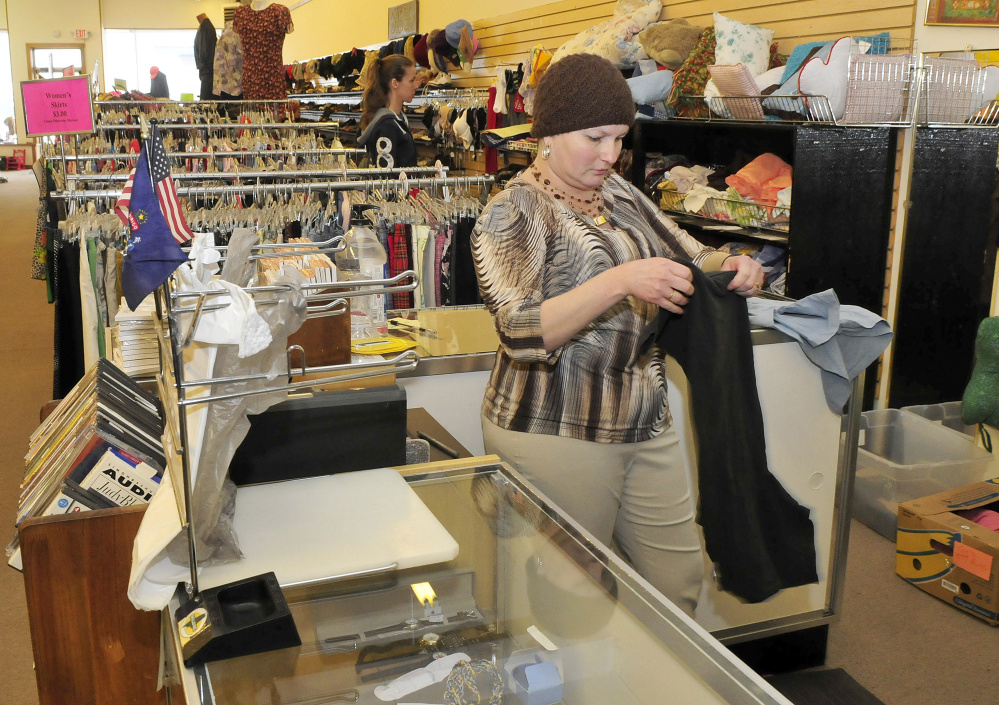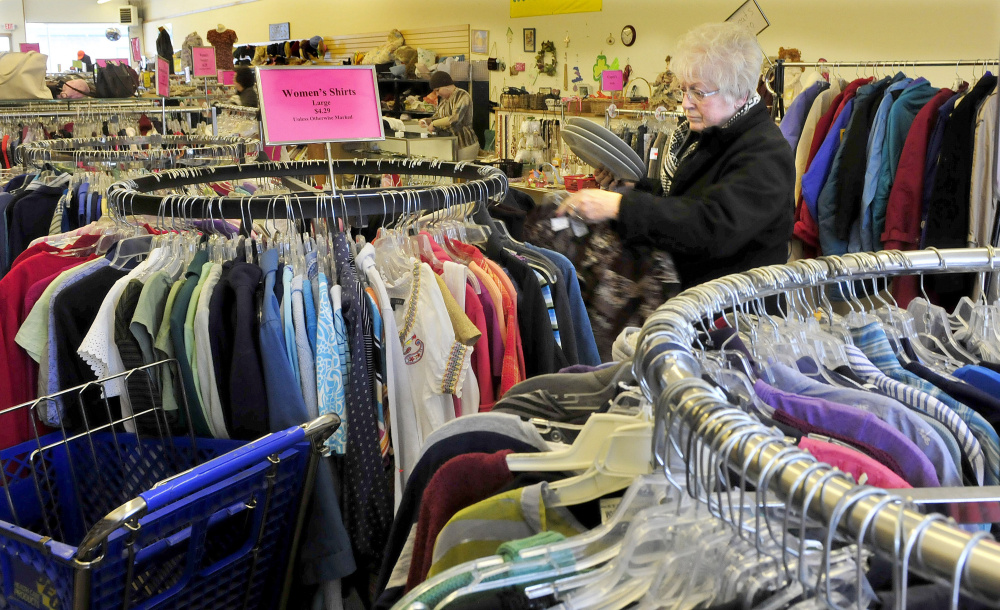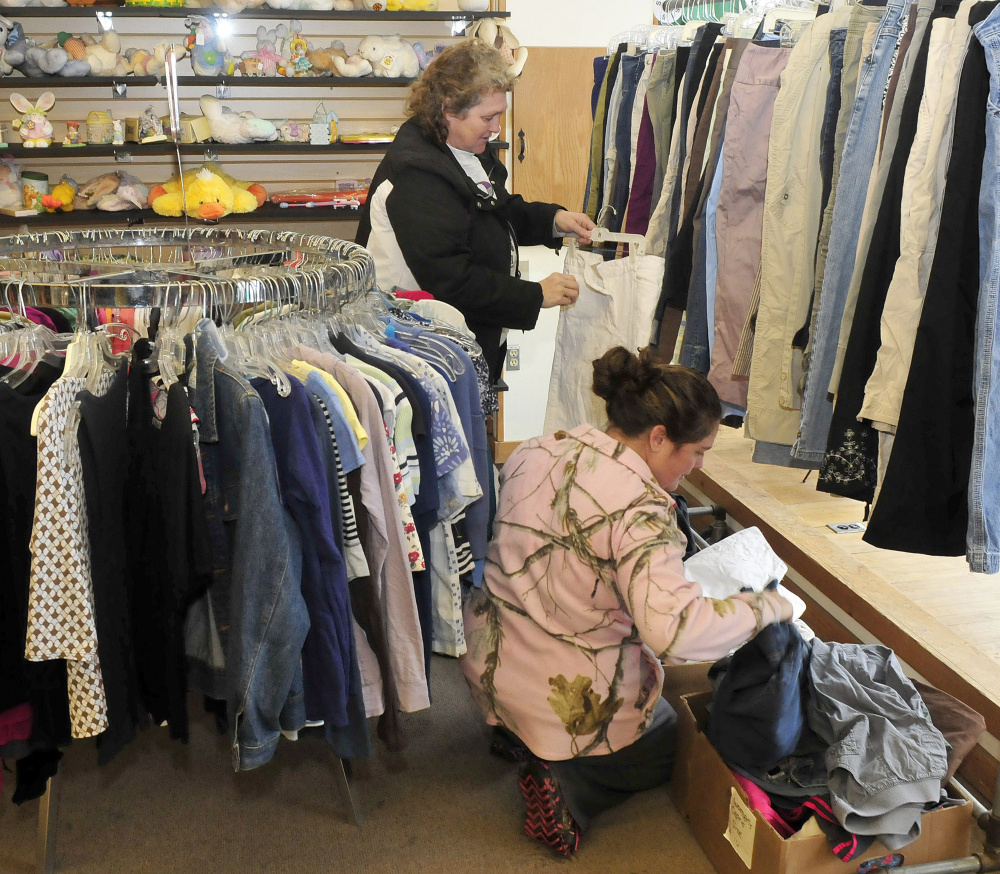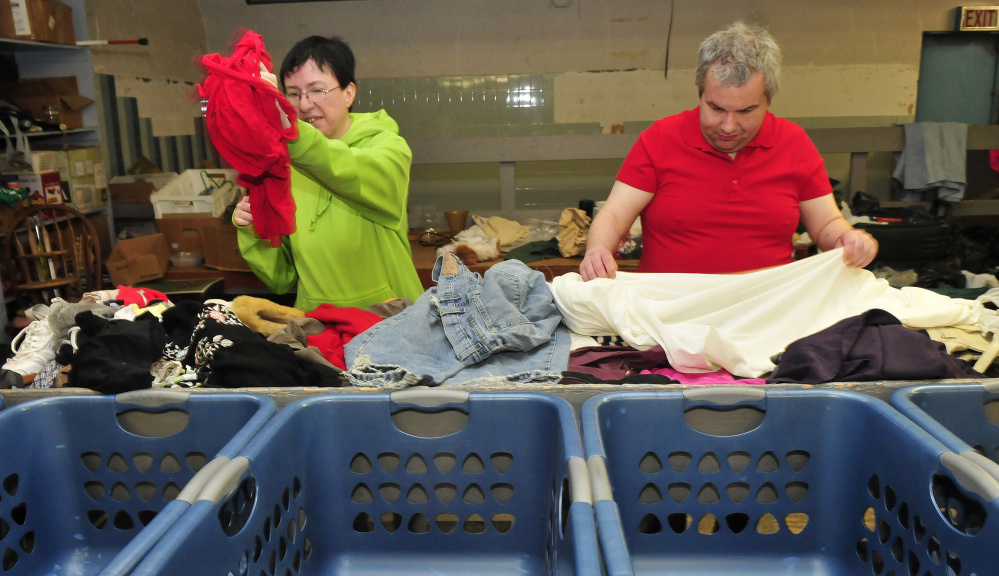The scheduled closing of two thrift stores in Somerset County operated by a Maine nonprofit organization for adults with intellectual disabilities is part of a national movement to phase out such supervised workplaces.
St. Albans-based Skills Inc. announced the closing of its stores in Skowhegan and Pittsfield this week in an email to employees and on the organization’s Facebook page.
The move will put 16 people out of work, four of whom are people with disabilities, but also will affect the employment of more than 25 other people who work part time at Skills’ L.C. Dill Center in Skowhegan, sorting and delivering clothing for the thrift stores.
The scheduled closing date at both locations is March 13.
“We have struggled for years to make the thrift stores break even,” Skills CEO Tom Davis said in the company email. “This is not the fault of store employees who have been terrific. It is simply a matter of increased competition and a changing environment for these sorts of stores.”
Under pressure from the federal government, states are starting to phase out sheltered workshops — supervised workplaces for physically disabled or mentally handicapped adults. There’s disagreement within the disabilities community about whether that’s a good idea.
Skills was created in 2005 when Sebasticook Farms and Ken-A-Set merged to form Skills, Inc. Services include residential care, day activities and employment services. The organization employs more than 280 workers and provides daily service to about 200 people.
The Skills Waterville thrift store on College Avenue closed in February 2015 and moved its inventory to Pittsfield, displacing 20 employees — 15 of whom were adults with developmental disabilities. Inventory from the thrift shop, which opened in Waterville in the 1970s, was moved to the new shop in a former Family Dollar store in the Somerset Avenue plaza in Pittsfield.
Davis said he doesn’t think the move out of Waterville harmed the thrift store operation, but rather, the retail market and funding conditions are to blame.
Davis said there is a national movement to close sheltered workshops and that the funding to operate a sheltered workshop in Maine disappeared several years ago.
“Organizations that continue to operate this type of service are self-funding these services,” Davis said. “Going forward, it is very hard to see how any organization will be able to continue to operate this type of service for the long haul.”
Tammy Worth, team leader at the Dill Center, said program participants no longer will have spending money and will lose their sense of contributing to the community when the thrift shops close. Worth said each participant puts in two hours of work daily as part of the program at the Dill Center.
She said state funding for community support, or day programs for the disabled, is still there; but funding for sheltered workshop employment is gone.
“Most of the jobs here are sorting the donations, moving the donations from the boxes inside and packing the stuff for the store,” Worth said. “They’re going to be losing that feeling that they’re helping people.”
With the end of the sheltered workshops, that spending money and those feelings will be gone, she said.
Davis said the organization, which serves about 200 adults, will do “everything possible” to help laid-off employees get other jobs.
“Everywhere you look there’s a new dollar store, there’s a new secondhand store. Thrift stores are everywhere,” he said Thursday. “We were underwater financially on the stores; we were losing money every month.”
Twenty-five people will be losing their jobs. Cleaning and janitorial crews made up of program participants also will be done away with, Worth said. The Dill Center’s Meals on Wheels program will remain in place, and the program staff will look for other ways the participants can earn money and maintain “that self-worth feeling,” Worth said.
‘A REAL LOSS’
Program participants Patty LeClair and Dale Weymouth, who are their own guardians, said they have work to do every day and like having a little money in their pockets. They also like doing the work and feeling appreciated, they said Thursday.
“I do a lot of different things when they need me,” Weymouth said. “If I had more work, it would be important to me a lot because I like to make extra money for myself. That’s the reason I like to work. If the store closes, I might have to look for something different, like a part-time job, and that’s going to be harder on me, too.
“It really hurts me a lot. I’ve put some hard work in this, and then it goes kerplunk.”
LeClair, who was comforted Thursday by Weymouth, said it was going to be hard “finding another job in the world.
“I do everything,” LeClair said. “I save up for Special Olympics and I go out for lunch and to camp and stuff like that. It just hurts.”
Worth said all of their earnings from the work programs — rough sorting and fine sorting for the thrift store — at the Dill Center will be eliminated. She said 15 20-pound bags of rags sorted at the center are sold every week to the Huhtamaki fiber plant in Waterville.
Davis said Skills has a waiver agreement on wage regulations with the state Department of Labor that allows the company to hire program participants at a pay rate that is below the minimum wage. He said it is important to him and to the workers for them to have a job and to contribute to society.
“Every job we lose is a precious job lost because they’re hard to find in the community,” he said. “They are hugely important to the program participants. This is a real loss. This is a major loss for them. This is not some little thing.”
Worth added that the companionship of participants working together, taking breaks from work, or going out for lunch, also is important to them. In jobs outside of the program, they would feel isolated and alone, she said.
SHOPPER REACTION
Workers and shoppers at the Skills thrift shop in Skowhegan this week said they were sorry to hear the store is closing.
Store manager Donna Grant said she understands how competition from other secondhand-goods stores affects her store, but it is still disheartening to lose her job.
“I really have no idea what I’m going to do now, because I’m a cancer patient,” Grant said. “I have to get radiation and Skills has been great working with me on that.”
Grant, of Madison, said her husband has insurance, so she is covered, but not having a job and an income is going to hurt.
“It’s very sad, because all the customers have come up to us to say, ‘We’re going to miss this place. We’re really sad that it’s going,'” Grant said.
Linda Thebarge, of Skowhegan, said she is a regular customer.
“There’s nothing left here in this town like this,” Thebarge said. “I go around and I get things for the women at the shelter in Solon because when they leave the shelter itself, they don’t have anything to start with.
“It’s devastating; it is. I get things for my family, for myself — year-round. I might be in here three days a week.”
Doug Harlow — 612-2367
Twitter:@Doug_Harlow
Send questions/comments to the editors.







Success. Please wait for the page to reload. If the page does not reload within 5 seconds, please refresh the page.
Enter your email and password to access comments.
Hi, to comment on stories you must . This profile is in addition to your subscription and website login.
Already have a commenting profile? .
Invalid username/password.
Please check your email to confirm and complete your registration.
Only subscribers are eligible to post comments. Please subscribe or login first for digital access. Here’s why.
Use the form below to reset your password. When you've submitted your account email, we will send an email with a reset code.